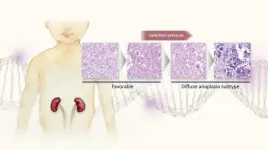(Press-News.org) A group of patients with a hereditary disorder have had their lives transformed by a single treatment of a breakthrough gene-editing therapy, according to the lead researcher.
The patients from New Zealand, the Netherlands and the UK have hereditary angioedema, a genetic disorder characterised by severe, painful and unpredictable swelling attacks. These interfere with daily life and can affect airways and prove fatal.
Now researchers from the University of Auckland, Amsterdam University Medical Center and Cambridge University Hospitals have successfully treated more than ten patients with the CRISPR/Cas9 therapy, with interim results
just published in a leading journal.
“It looks as if the single-dose treatment will provide a permanent cure for my hereditary angioedema patients’ very disabling symptoms,” says principal investigator Dr Hilary Longhurst, who is both a clinical immunologist at Auckland Hospital Te Toku Tumai and an honorary associate professor at the University of Auckland.
“Plus, of course, there is huge potential for development of similar CRISPR/Cas9 treatments for other genetic disorders.”
Globally, it is estimated one in 50,000 people have hereditary angioedema, however, because it is rare, it is often not correctly diagnosed.
In the phase one study, there were no serious or lasting side-effects from the single infusion, which took place over two to four hours under clinical supervision from late 2021 and onwards.
The investigational therapy, called NTLA-2002, utilises in vivo CRISPR/Cas9
technology to target the KLKB1 gene, which is responsible for producing plasma prekallikrein.
By editing this gene, the therapy reduces the levels of total plasma kallikrein, effectively preventing angioedema (swelling) attacks.
The trial, published in the New England Journal of Medicine, demonstrated dose-dependent reduction in total plasma kallikrein protein with reductions of up to 95 percent achieved.
A mean reduction of 95 percent in angioedema attacks was observed across all patients through to the latest follow-up.
The patients from the initial study will be followed up for a further 15 years to continue to assess long-term safety and efficacy.
A larger and more robust, double-blinded, placebo-controlled phase two trial is under way and a Phase 3 trial is planned to start in the second half of 2024.
Dr Danny Cohn, from the Department of Vascular Medicine at the Amsterdam University Medical Center says these promising results are a step forward for this group of patients.
“We’ve never been closer to the ultimate treatment goal of normalising hereditary angioedema patients’ lives and offering total control of the disease,” says Dr Cohn.
Dr Padmalal Gurugama, consultant in clinical immunology and allergy at Cambridge University Hospitals, UK says the gene editing therapy has the potential to significantly improve patients’ lives.
“Hereditary angioedema can cause patients severe swellings and intense pain which can be life-threatening as well as restricting normal activities, such as going to work or school.
“Because it is often misdiagnosed, many patients undergo unnecessary treatments and invasive procedures.”
The therapy affects only the patient and is not passed onto their children, who still have an even chance of inheriting the disorder.
The studies have been funded by US company Intellia Therapeutics, which chose New Zealand to lead the research as, at that time – late 2021, it had relatively fewer Covid-19 cases than other countries.
So far, the only approved CRISPR therapy, CASGEVY, is for sickle cell disease and beta thalassemia. However, CASGEVY is an ex vivo CRISPR therapy, where the cells are taken from the patient and edited outside of the body and then reinfused, whereas NTLA-2002 is an in vivo CRISPR therapy, where the targeted gene editing occurs directly within the body.
CRISPR technologies are being used to develop treatment for a wide range of diseases, such as genetic disease, cardiovascular disease, cancer and autoimmune diseases. See Intellia’s website.
‘A medical magic wand’
One New Zealand patient, Judy Knox, says, “Having had the CRISPR/Cas9 therapy has been like a medical magic wand, it’s changed my life.”
Before she was diagnosed, Judy would get abdominal swelling with vomiting and severe pain that could last several days.
Dental surgery could prompt dangerous swelling in her mouth, including her tongue and palette, and her throat that were excruciatingly painful and threatened to suffocate her.
Once diagnosed Judy, who is a nurse in Whāngarei, carefully managed her androgen medication and was prepared to increase it (within prescribed dose) to deal with any flare-ups.
In recent years supply of this medication was not always reliable which became a very real concern for her. Judy knew that there were emergency medications available in New Zealand that, although funded, are still extremely expensive.
When the opportunity to participate in the study came up, she wasted no time volunteering and was one of the first people in the world to receive the CRISPR/Cas9 therapy in a clinical research centre in New Zealand.
“I put my hand up and said, ‘I'll do it.’ And because it was beneficial to others.”
Another factor was her concern about the continuing availability of the drugs she needed.
Now she has weaned herself off her medicines and feels she has a ‘whole new life’.
To anyone contemplating the therapy, she would say, “Go for it, because it really works.”
END
Gene-editing offers hope for people with hereditary disorder
A group of New Zealand patients with a serious genetic condition have come off their medications after a single gene-editing treatment.
2024-02-02
ELSE PRESS RELEASES FROM THIS DATE:
New molecule from University step closer to treatment for rare disease
2024-02-02
A molecule created at the University of Auckland is one step closer to becoming a treatment for an extremely rare and severely debilitating neurological disorder called Phelan-McDermid syndrome. Children with the disorder showed significant improvements in a phase two clinical trial in the US, Neuren Pharmaceuticals, which is listed on the Australian Securities Exchange, said in December.
Next steps would be a phase three trial and seeking approval from the US Food & Drug Administration. The molecule, NNZ-2591, comes from work years ago ...
Machine learning to battle COVID-19 bacterial co-infection
2024-02-02
University of Queensland researchers have used machine learning to help predict the risk of secondary bacterial infections in hospitalised COVID-19 patients.
The machine learning technique can help detect whether antibiotic use is critical for patients with these infections.
Associate Professor Kirsty Short from the School of Chemistry and Molecular Biosciences said secondary bacterial infections can be extremely dangerous for those hospitalised with COVID-19.
“Estimates of the incidents of secondary bacterial infections in COVID-19 ...
Some tumors ‘grow bad’: Why a dangerous subtype of Wilms tumor is so resistant to chemotherapy
2024-02-02
An international team, led by researchers at Nagoya University in Japan, may have determined why the diffuse anaplasia (DA) subtype of Wilms tumor (WT) resists chemotherapy. This subtype grows even when it has a high burden of DNA damage and increases the mutation rate of tumor protein 53 (TP53), a gene that plays a critical role in the regulation of cell growth and division. The team’s findings, published in Modern Pathology, suggest new ways to treat this subtype.
WT, also known as nephroblastoma, is the most common childhood cancer originating in the kidney. Fortunately, the survival rate of adolescents ...
Disrupted cellular function behind type 2 diabetes in obesity
2024-02-02
Disrupted function of “cleaning cells” in the body may help to explain why some people with obesity develop type 2 diabetes, while others do not. A study from the University of Gothenburg describes this newly discovered mechanism.
It is well known that obesity increases the risk of insulin resistance and type 2 diabetes. It is also well known that some people who gain weight suffer from the disease and others do not. The reasons for these differences are not clear, but they are related ...
USC launches School of Advanced Computing
2024-02-02
USC President Carol Folt launched the university’s first new school in more than a decade: the USC School of Advanced Computing, a cornerstone of her $1 billion advanced computing initiative. The school seeks to educate all students, regardless of their major, in the ethical use of computing technology as part of the president’s Frontiers of Computing initiative.
Gaurav Sukhatme — a professor of computer science and electrical and computer engineering, and executive vice dean of the USC Viterbi School of ...
A clutch stretch goes a long way
2024-02-02
Kyoto, Japan -- Cell biology has possibly never jumped to the next level in the same way.
In multicellular organisms, cell migration and mechanosensing are essential for cellular development and maintenance. These processes rely on talin, the key focal adhesion -- or FA -- protein, central in connecting adjacent cellular matrices and enabling force transmission between them.
Talins are commonly considered fully extended at FAs between actin filaments -- or F-actin -- and the anchor-like integrin receptor.
Yet, a research ...
Psychological care delivered over the phone is an effective way to combat loneliness and depression, according to a major new study
2024-02-02
The study, led by a team based at the University of York and Hull York Medical School and at Tees, Esk and Wear Valleys NHS Foundation Trust, found levels of depression reduced significantly and the benefits were greater than those seen for antidepressants.
Participants in the study reported their levels of emotional loneliness fell by 21% over a three-month period and the benefits remained after the phone calls had ceased, suggesting an enduring impact.
The Behavioural Activation in Social ...
Insulin prices in US are more than twice as high as in other wealthy nations
2024-02-02
The gross price of insulin in the U.S. is more than nine times higher than in 33 high-income comparison nations, according to a new RAND report.
Although the cost differences of insulin between the U.S. and other nations varied depending on the comparison country and the type of insulin, U.S. prices were always higher -- often five to 10 times higher -- than those in other countries. The new report updates findings from earlier RAND work about U.S. insulin prices.
After accounting for rebates and other discounts often offered by drug ...
My love language is peer-reviewed research
2024-02-02
Feb. 1, 2024, TORONTO – From the Five Love Languages to the concept of “Happy Wife, Happy Life,” popular culture is riddled with ideas of how sex and relationships are supposed to work, but does the science back these ideas up? According to Faculty of Health Assistant Professor and Research Chair in Relationships and Sexuality Amy Muise, the answer is frequently no.
Ahead of Valentine’s Day, Muise, also director of the Sexual Health and Relationship (SHaRe) Lab, can offer alternative theories that are supported by her research and other literature in the ...
Husker researchers using metabolic model to study temperature stress on corn
2024-02-02
A research team led by Nebraska scientists has built the largest-ever metabolic model of corn to study how temperature stress affects the plant and how a certain fungus can help alleviate the problem.
The research is an expansion of earlier work with a metabolic model of corn roots that the same team used to study the plant’s nitrogen-use efficiency under nitrogen stress conditions, said Rajib Saha, Richard L. and Carol S. McNeel associate professor of chemical and biomolecular engineering and principal investigator. Saha and ...
LAST 30 PRESS RELEASES:
ASU researchers to lead AAAS panel on water insecurity in the United States
ASU professor Anne Stone to present at AAAS Conference in Phoenix on ancient origins of modern disease
Proposals for exploring viruses and skin as the next experimental quantum frontiers share US$30,000 science award
ASU researchers showcase scalable tech solutions for older adults living alone with cognitive decline at AAAS 2026
Scientists identify smooth regional trends in fruit fly survival strategies
Antipathy toward snakes? Your parents likely talked you into that at an early age
Sylvester Cancer Tip Sheet for Feb. 2026
Online exposure to medical misinformation concentrated among older adults
Telehealth improves access to genetic services for adult survivors of childhood cancers
Outdated mortality benchmarks risk missing early signs of famine and delay recognizing mass starvation
Newly discovered bacterium converts carbon dioxide into chemicals using electricity
Flipping and reversing mini-proteins could improve disease treatment
Scientists reveal major hidden source of atmospheric nitrogen pollution in fragile lake basin
Biochar emerges as a powerful tool for soil carbon neutrality and climate mitigation
Tiny cell messengers show big promise for safer protein and gene delivery
AMS releases statement regarding the decision to rescind EPA’s 2009 Endangerment Finding
Parents’ alcohol and drug use influences their children’s consumption, research shows
Modular assembly of chiral nitrogen-bridged rings achieved by palladium-catalyzed diastereoselective and enantioselective cascade cyclization reactions
Promoting civic engagement
AMS Science Preview: Hurricane slowdown, school snow days
Deforestation in the Amazon raises the surface temperature by 3 °C during the dry season
Model more accurately maps the impact of frost on corn crops
How did humans develop sharp vision? Lab-grown retinas show likely answer
Sour grapes? Taste, experience of sour foods depends on individual consumer
At AAAS, professor Krystal Tsosie argues the future of science must be Indigenous-led
From the lab to the living room: Decoding Parkinson’s patients movements in the real world
Research advances in porous materials, as highlighted in the 2025 Nobel Prize in Chemistry
Sally C. Morton, executive vice president of ASU Knowledge Enterprise, presents a bold and practical framework for moving research from discovery to real-world impact
Biochemical parameters in patients with diabetic nephropathy versus individuals with diabetes alone, non-diabetic nephropathy, and healthy controls
Muscular strength and mortality in women ages 63 to 99
[Press-News.org] Gene-editing offers hope for people with hereditary disorderA group of New Zealand patients with a serious genetic condition have come off their medications after a single gene-editing treatment.




